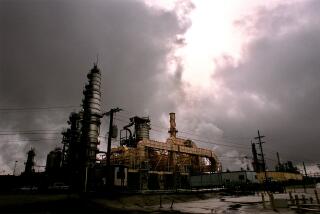‘Oil Prices and the Gulf War’
- Share via
In your editorial “Oil Prices and the Gulf War” (July 20), you wrote that cheaper oil is a “mixed blessing.” Why not call it an unmixed blessing period?
In addition to keeping prices down (which you listed), I see three benefits from cheaper foreign oil: 1) increased production of goods and services for us and for export, 2) conservation of our oil, and 3) conservation of our precious wilderness and coastal environments. Until we have non-fossil, self-sufficient, safe, and cheap energy sources, we should use the cheaper foreign oil and conserve ours.
For our defense and economic survival, the Pentagon should buy oil stockpiles, wells, and the best production equipment. In other words nationalize oil to the extent that private producers will not supply oil for defense and economic survival. At the same time and for the same reasons, the Pentagon should accelerate the development of the aforesaid non-fossil energy sources.
This may cause some short-term economic dislocation, as does the present high level (40%) of oil imports. But we certainly have not protected other industries from dislocation, have we? Why should we protect the oil industry, in the guise of “conservation,” while prescribing free trade for other industries?
I agree with you that the next President should think now about energy and conservation. But even more so, he should develop long-term programs that further our national interests, not merely please the oil industry.
LAWRENCE M. FISCHBACH
Claremont
More to Read
Sign up for Essential California
The most important California stories and recommendations in your inbox every morning.
You may occasionally receive promotional content from the Los Angeles Times.










